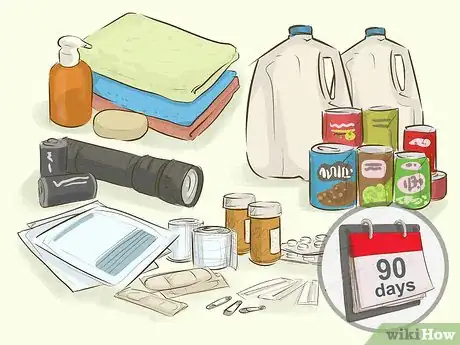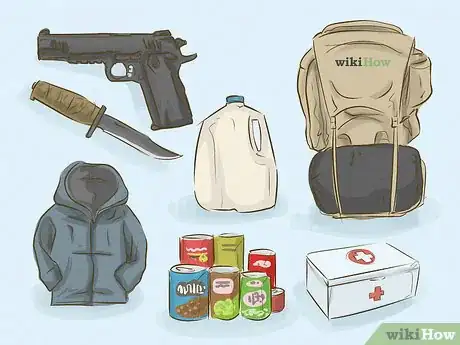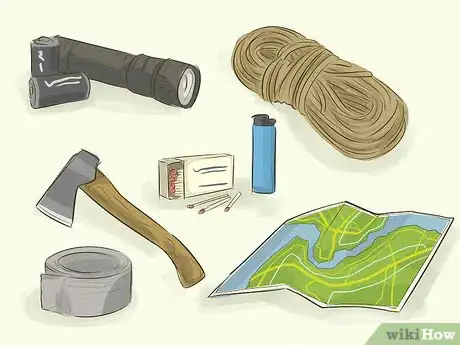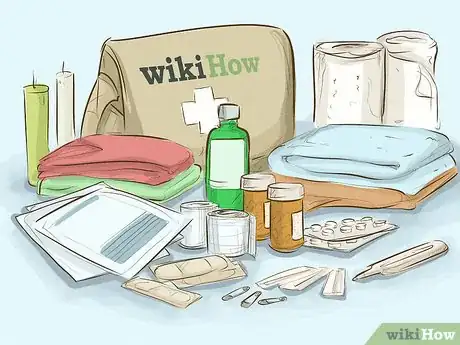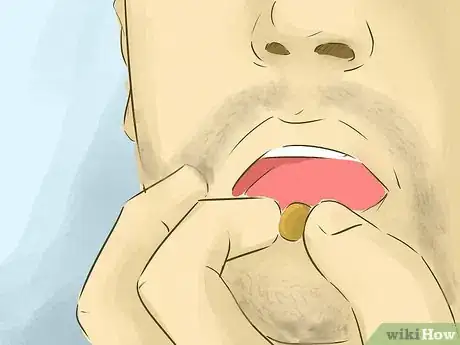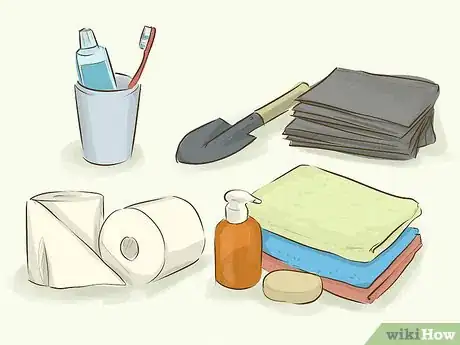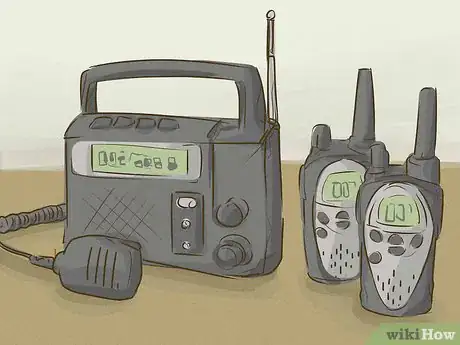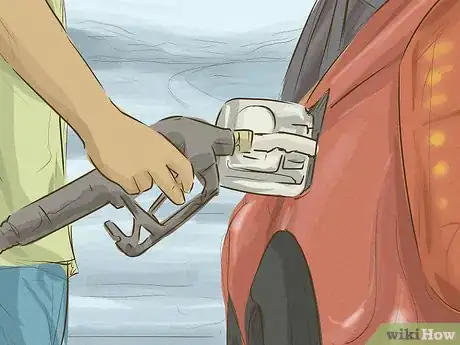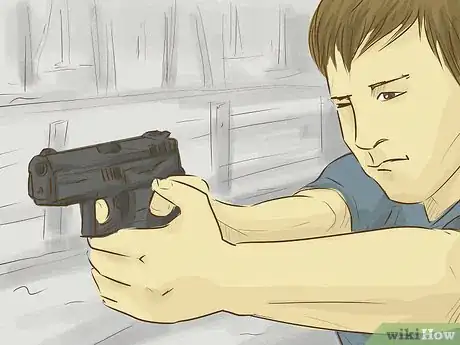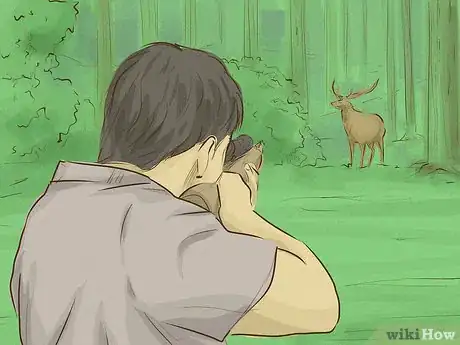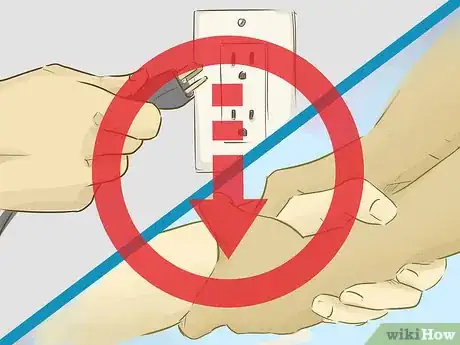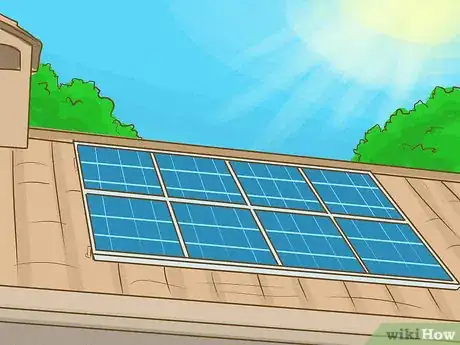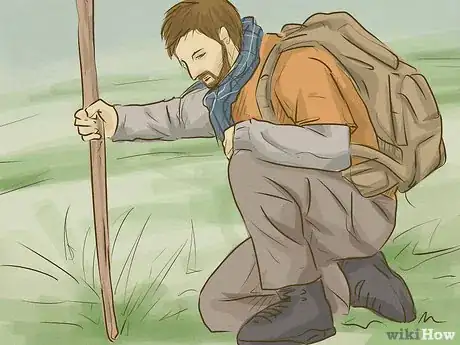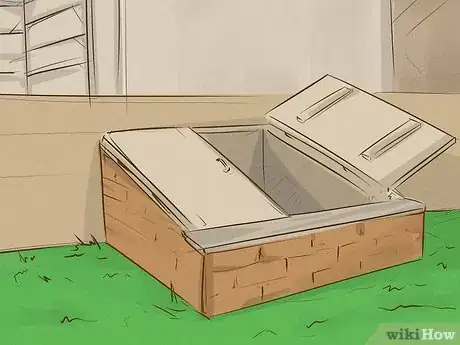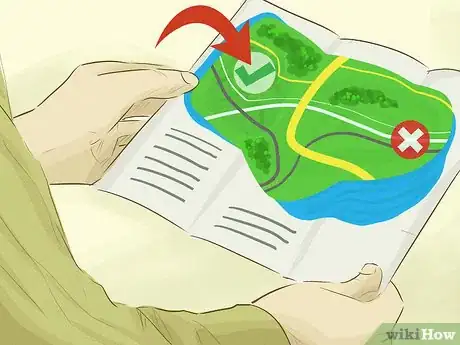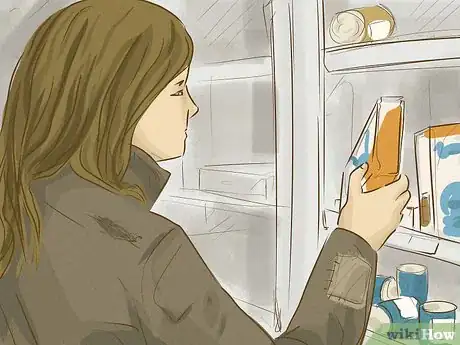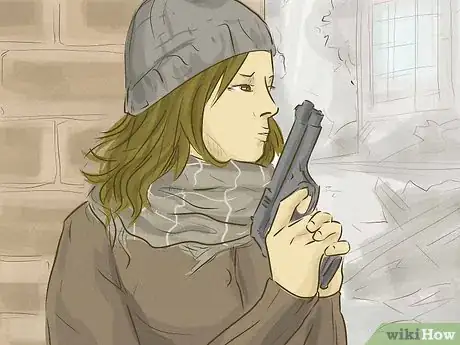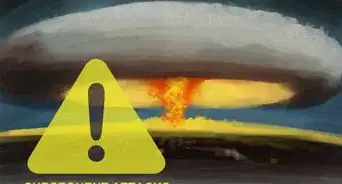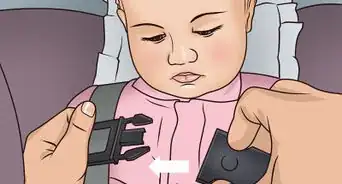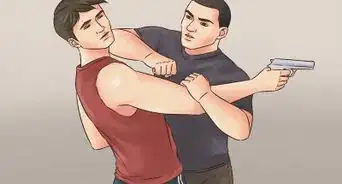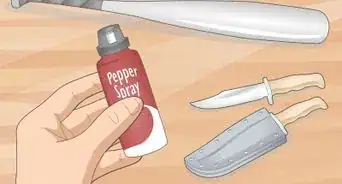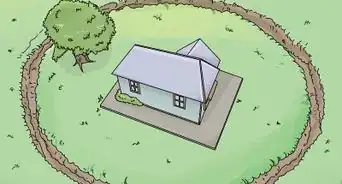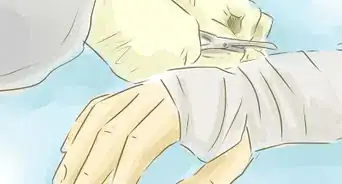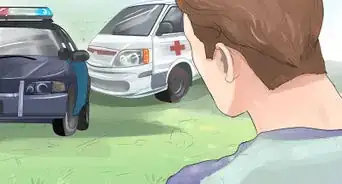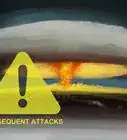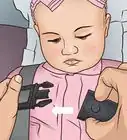wikiHow is a “wiki,” similar to Wikipedia, which means that many of our articles are co-written by multiple authors. To create this article, 165 people, some anonymous, worked to edit and improve it over time.
There are 10 references cited in this article, which can be found at the bottom of the page.
This article has been viewed 864,096 times.
Learn more...
What will happen if society collapses? What would you do if there's no one to help you or your family? Disaster preparedness is more than worrying––it's also about being practical, preparing for realistic scenarios and being ready for the unpredictable. An apocalypse is unlikely, but you'll need to know what to do in case it happens.
Steps
Preparing in Advance
-
1Gather sufficient supplies to survive for 90 days. Surviving after a major apocalyptic event is not going to be short term since the entire country or the world is likely to be falling apart––there are no two ways around that reality. However, hopefully having three months of supplies will get you settled and going with your new self-sufficient habits. The more time you have dedicated to forming a plan when disaster does strike, the better. When preparing the supplies, think in two categories: basic survival and getting by, as outlined in the following two steps.
-
2Obtain and stockpile basic survival (the most important) items. Consider storing the following:[1]
- Jugs of water
- Canned goods
- Vacuum-sealed goods
- Blankets and pillows
- Medications
- A weapon that you actually know how to use properly
- A knife (in addition to a weapon)
- Warm, long sleeved clothing (if your climate requires it)
- Carrying bag (for moving and/or fleeing).
Advertisement -
3Store supplies for just getting by. Think about having these items at your disposal:[2]
- Batteries
- Flashlights
- Matches
- Pots and pans (for cooking or boiling water)
- Plastic utensils (plate, mug, spoon, fork)
- Rope or twine
- Map
- Permanent markers (something to write with)
- Change of clothes
- Can opener
- Lighters
- Camp stove and propane
- Hatchet or axe
- First aid book
- Sunglasses
- Duct tape
- Glow sticks
- Boots
- Extra pants
- Smartphone
- Water filters
- Other comfort items
-
4Prepare an emergency kit. Whether you're trying to survive the aftermath of a major earthquake, impact event, or global pandemic, you'll need to think about your health. Here's a list for what you need to put in your emergency kit:[3]
- Adhesive bandages, such as Band-Aids
- Gauze
- Medical tape
- Antibiotics
- Antiviral drugs
- Ibuprofen (non-steroidal anti-inflammatory drug (NSAID))
- Acetaminophen/paracetamol (over-the-counter pain relief)
- Antihistamine
- Aspirin (over-the-counter pain relief)
- Laxative
- Iodine
- Potassium Iodine
- Hand sanitizing liquid
- Candles
- A multi-use tool (aka a "hobo tool")
- Phone charger (preferably solar)
- Wood for burning
- Towels
- Life jackets, if your area is prone to flooding
- Extra warm clothes
- Paper towels
- Solar chargers
- Pet food (enough for 30-90 days)
- Tweezers
- Plasters
- Safety pins
- Thermometer
- Superglue
- Toothpicks/needles
-
5Keep yourself healthy against everything. You'll be dealing with everything from cuts to dysentery. Hospitals will cease to function and exist so simple problems will seem a lot more daunting. If you or a family member has a specific ailment, stockpile medications for that, too.
-
6Plan how to prepare for the messier sides of the long-term. That's a nice way of saying, "Everybody poops." To keep hygiene from being an issue on top of everything else, pack the following:
- Toilet paper (a couple rolls will suffice)
- Menstrual products
- Toothbrush and toothpaste
- Plastic garbage bags and ties
- Shovel or trowel
- Bleach
- Soap and shampoo
-
7Set up a communication system. Everyone in the household and close family and friends should have a communication system to communicate with family and friends. Communicate secret locations with your family members and friends using a radio.
- Keep batteries with your radio. The last thing you want is to presume you're prepared when you're really not. And if you have a loved one you're taking care of, make sure they have a radio and you're not keeping both of them for the two of you.
- When all else fails, work out how you will contact each other. This is when your permanent markers will come in handy. If the apocalypse strikes and you have left the house, write down where you are going, when you left, and if/when you'll be back on the wall, on a rock, on a nearby car, wherever you can find.
-
8Use diesel-powered vehicles. Hoarding gasoline won't work; the chemicals that once kept it fresh will degrade it in time. After a year or so, it goes bad. Chances are gas stations will run out of gasoline but there could be some diesel left. In addition, all military diesels can run on other fuels as well, from rotten kerosene to fermented leaves. So invest in something that can handle the harder fuels.[4]
- In said vehicle, it's equally as likely that you'll be in it when all breaks loose, so pack a survival kit to keep in your car as well. Is there such a thing as being too prepared?
- If this isn't an option, make sure you have a bicycle laying around somewhere that's fully functioning. There will be a point when you need to cover large distances in a short amount of time.
-
9Become a good shot. Depending on the circumstances surrounding the apocalypse, knowing how to handle a gun can mean the difference between life and death, particularly if you'll need to hunt or defend your home against violence.[5]
- If it's legal to do so where you live, it might be a good idea to purchase a gun ahead of time and become proficient at using it. Be sure to exercise gun safety at all times. For starters, always keep the muzzle pointed in a safe direction, unload the gun when not in use, always treat a gun as though it is loaded (even when you know it isn't), keep the gun where children cannot access it, be sure of your target and what lies beyond it, and regularly have the gun serviced by a firearms professional.[6]
- Regardless of who or what you'll be facing, this is probably a good idea. Anything menacing needs to be kept far, far away. Whatever or whoever your enemy, shooting them will probably increase your chances of not being attacked or eaten.
- Unless the apocalypse is due to some bacteria that's floating around in the air. In that case, get a gas mask. The people/zombies/menacing forces will probably still see you as an enemy.
-
10Learn how to hunt.
- Master the art of the snare trap. If you're really scrappy with it, you need nothing but what nature provides you.
- If you're on the ocean or near a body of water, get to fishing or fly fishing. Your stock of baked beans and Spaghetti O's certainly isn't going to start spawning miraculously.
- Take a hint from Katniss Everdeen and start honing your archery skills. Once you've got a reason, learn how to make your own bow.
-
11Read up on disaster preparedness. Take the time to read through wikiHow's disaster preparedness section. Read as many non-fiction books about disaster preparation and survival essentials as you can.
- Consider reading some novels about the apocalypse, as well, but don't rely on these for accurate advice since you won't necessarily know how much effort the author put into research. Examples of books to read include: The Road by Cormac McCarthy, Lucifer's Hammer by Larry Niven, Alas, Babylon by Pat Frank, Earth Abides by George R. Stewart, Stephen King's The Stand, and The Day of the Triffids by John Wyndham are all great places to start (even if the apocalypse doesn't end up coming anytime soon). You've already watched The Hunger Games, right?
-
12Become less dependent. If we're all honest with ourselves, what kind of world could we recreate without others?[7]
- For most of us, not much. Can you make a battery from a lemon? Or a potato clock? Lowering the bar... how are you at tying knots?
-
13Find a way to generate your own electricity. Taking car batteries and daisy chaining them will act as an energy storage device, but you're going to need to generate power. A generator running on wood, gas or a diesel engine where you can make your own fuel is good, but the real payoff is using renewable energy by making your own wind turbine out of PVC pipes and a car alternator or scavenging some solar panels near a highway. When the events do take a turn for the worst, at least you'll be able to be productive at night and have some of the luxuries of your former life.
- Having electricity in your safe house will keep the lights on and keep electronics running. Electricity is important to run power tools, welders, water/fuel pumps, radio equipment as well as charge any portable item or comfort item you may wish to use. It'll be a surprising source of morale, too.
-
14Pray. Over time, new society will form. The collapse of a single city usually summons the National Guard, meaning that you will be relocated to a different society eventually. The collapse of a country means that you can now start your own country.
Escaping Immediately Without Advanced Warning
-
1Grab a long-sleeved shirt and some pants. If you were out lounging on your pool deck with nothing but earbuds on and iPhone in hand (how else would you be reading this?), you're going to want to put on some layers. Even if the meteor looming on the horizon will send a blast of heat from here to Fargo, you'll be glad you did.[8]
- Pretty much any cause for an apocalypse requires long, comfortable clothing. You want a long-sleeved shirt and pants to protect your skin from predators, yes, but also from the sun and treacherous terrain. The apocalypse is no time to work on your tan.
- If you have time, grab a pair of boots. If you don't have boots nearby, go for tennis shoes. You may have to break into a dead sprint at any time. If you have the luxury, make sure you're comfortable enough in your clothes and shoes to flee.
-
2Come up with an escape plan. If for some odd reason your house isn't safe to stay in, you'll need to get out as soon as possible. With your map in hand, get out and get out now. Would you do best in the forest? Near water? Are you concerned with privacy and hiding from others or is there not another soul in sight? Your specific situation will determine where you should go.
- Again, if you can stay in your house, do so. A shelter is best and friends and family will know how to find you. Make an assessment of your situation. Be as logical and rational as possible. You may want to stay, but is it best for you and your family?
-
3Seek shelter. Even if it's not nuclear, you'll be better off escaping the perils of weather and being exposed to predators by getting and staying inside. But if it's a blast that is putting down the human race, it's doubly imperative that you shield yourself from the radiation as quickly as you can.[9]
- Basements are a good place to start. 16 inches (40.6 cm) of solid brick can keep radiation away from you, so you should fairly set there -- not to mention among your own things. One inch (2.5cm) of steel will do it too, but you probably don't live on the Enterprise.
-
4Find a food source. You'll probably want this to be from a remnant of your soon-to-be past and not a raspberry bush or particularly lively pond. A grocery store or even recently-deserted houses are your best bet. As you're scrounging, get a candy bar and chow it down. The last thing you want to think about right now is hunger.
- And stock up. Don't think in terms of days; think in weeks. Grab a few bags and start scrumping. What can you carry that'll last the longest? Think in volume and weight in addition to preservation. Cans are good, but they're heavy. But if everything is already picked over, don't get fussy; take what you can get. You'll need just anything to survive.
- Water. Get loads and loads and loads of water, or else you'll be drinking your pee in no time.
-
5Go on the defensive. It's safe to assume at this juncture that whatever is out there is not your friend. Find a weapon that you can actually use and start watching your six. When it comes to humans, there is no place for intelligence and culture now -- you do what you need to do.[10]
- Don't flash your gun like you do your BMW. Conceal your weapons. You know that scene in Die Hard where Bruce had those guns taped to his back (despite the fact that tape doesn't adhere easily to pools of sweat) and pulled a one-over on that German villain either played by Jeremy Irons or Alan Rickman? That's going to be you. No one's going to pull the wool over your eyes. You're a weapon yourself.
-
6Find other survivors. You've got your food, you've got your weapons, and you've staked out a place to stay. Now it's time to assemble a team a la The Walking Dead. Except that you want a team that is actually useful. When you consider taking on others (they're mouths to feed, after all), assess what they can do for you. Do they know plants? Are they a wizard with a javelin? Are they carrying their own stockpile of food?
- Okay, you'll probably want friends so you shouldn't be too picky. If you're not going to assess them for their goods, at least consider their character. Does your gut tell you they're trustworthy?
- If you're all alone, keep a look out for lights and fires at nighttime. If you see one or more, consider venturing out yourself to make new best friends, but only if you think the end would justify the means. How far away is the light? How quickly could you get there? What would you be risking by leaving? Are there predators or obstacles in your path? You may be better off being alone, for now.
-
7Stay positive. This will arguably be the hardest thing, especially if you're alone or wounded. But ultimately this hardship will be easier to handle if you remain optimistic about it. And if there are children with you, all the more reason.[11]
- Do not let your ethics stand in the way of your identity. The rules are different now. Just because you decided someone isn't pulling their slack and the team should, therefore, cut their losses doesn't mean you've turned into an animal. Assess your moralities as you see fit, but understand that the world is a much different place now and you must adapt to it to stay alive and fruitful.
Community Q&A
-
QuestionIn the theoretical case of a future apocalypse: I find someone who is better-armed, better-supplied, and - in general - better-prepared than I. They're heavily armed, and look menacing. Should I try to forge an alliance, or risk fighting?
 Joshua WiebelhausCommunity AnswerDo you have skills they would require? Are you a doctor, surgeon, blacksmith, mechanic? If you have useful skills like these and can handle yourself, then you are just as valuable to the other person as he is to you, still he may be mentally unstable or just a jerk so best be cautious.
Joshua WiebelhausCommunity AnswerDo you have skills they would require? Are you a doctor, surgeon, blacksmith, mechanic? If you have useful skills like these and can handle yourself, then you are just as valuable to the other person as he is to you, still he may be mentally unstable or just a jerk so best be cautious. -
QuestionWould a garage work?
 MegDogeCommunity AnswerIf nobody but your team can get in and all the doors have proper working locks, then yes.
MegDogeCommunity AnswerIf nobody but your team can get in and all the doors have proper working locks, then yes. -
QuestionWhy would I need sunglasses in an apocalypse?
 Community AnswerSunglasses will keep harsh light and glare out of your eyes, prevent sunburn around your eyes, can serve as a useful quick disguise and can help you to avoid eye contact with people begging for help or trying to suss you out. If you end up in harshly lit environments, they will help you to see with ease (snow, desert, etc.). It just makes sense to have sunglasses as one of your must-haves, especially as you may need to spend a lot of time outdoors.
Community AnswerSunglasses will keep harsh light and glare out of your eyes, prevent sunburn around your eyes, can serve as a useful quick disguise and can help you to avoid eye contact with people begging for help or trying to suss you out. If you end up in harshly lit environments, they will help you to see with ease (snow, desert, etc.). It just makes sense to have sunglasses as one of your must-haves, especially as you may need to spend a lot of time outdoors.
Warnings
- Don't waste bullets. Using guns requires bullets. If you waste them, you'll probably die during an attack.⧼thumbs_response⧽
- Never advertise your preparedness plans to co-workers, friends, and extended members of your family. They will likely not be prepared and once their survival instincts kick in, they will turn to you or worse, turn on you for your supplies.⧼thumbs_response⧽
- Expect individuals to practice cannibalism due to the lack of food.⧼thumbs_response⧽
- People will form gangs in order to retrieve the resources they need to survive, resulting in safety with numbers. Know this and recognize this mob mentality.⧼thumbs_response⧽
- The criminal element that was once housed in local and federal prisons will be loose all over the countryside. It's best to assume the worst of humans are at this juncture.⧼thumbs_response⧽
- Law enforcement officers either real or fake cannot be trusted in an apocalypse.⧼thumbs_response⧽
- Rivers and lakes will be polluted with human fecal matter coming from the water treatment plants and overflowing sewers. Diseases like Typhoid and Cholera will strike with vengeance.⧼thumbs_response⧽
Things You'll Need
- Jugs of water
- Canned goods
- A few packaged, vacuum-sealed goods
- Blanket and pillow
- Medications
- A weapon
- Ammunition
- A knife (in addition to a weapon)
- Warm clothing (if your climate requires it)
- Carrying bag (for moving and/or fleeing)
- Batteries
- Flashlights
- Matches
- Pot (for cooking or boiling water)
- Eating ware (plate, mug, spoon, fork)
- Map
- Change of clothes (skin covering and comfortable)
- Can opener
- Camp stove and propane
- Hatchet or axe
- First aid book
- Duct tape
- Glow sticks
- Radio and/or walkie-talkies
- Lighters
- Water (30 to 90 days)
- Food (30 to 90 days)
- Duct Tape
- First Aid Kit (list above)
- Survival reference books (1 or 2)
- Signal Mirror (CD or camping mirror)
- Rope (20ft/ 7Yds)
- Sunglasses
- Hiking boots
- Bulletproof vest
- Identification documents
- A backpack, duffel bag, Hiking pack, etc.
- "Gift" items to give to unfriendly people you encounter
- Toilet paper (a couple rolls will suffice)
- Menstrual products
- Toothbrush and toothpaste
- Plastic garbage bags and ties
- Shovel or trowel
- Bleach
- Soap and shampoo
- Comfort items
- A bow or crossbow (for hunting and fighting)
- Compass and/or GPS
References
- ↑ https://www.ready.gov/build-a-kit
- ↑ https://montemlife.com/how-to-make-a-survival-kit/
- ↑ https://www.cdc.gov/disasters/earthquakes/supplies.html
- ↑ https://www.dieselforum.org/policyinsider/depend-on-diesel-for-hurricane-preparedness-and-recovery
- ↑ https://gundigest.com/more/how-to/3-must-apocalypse-guns
- ↑ https://www.nssf.org/safety/rules-firearms-safety/
- ↑ https://www.beprepared.com/blog/22141/self-reliance-101-producer-not-consumer/
- ↑ http://www.askmen.com/money/how_to_300/335_how_to.html
- ↑ http://www.askmen.com/money/how_to_300/335_how_to.html
About This Article
While having to survive an apocalypse is unlikely, there are certain things you can do to prepare, like gathering sufficient supplies to survive for 90 days. Basic survival items include jugs of water, canned goods, blankets, medications, clothing, and a knife. You may also want to stock up on some supplies that will make life more manageable, like a flashlight, matches, a pot, a map, duct tape, and a smartphone. Additionally, you should have an emergency kit that includes bandages, antibiotics, iodine, candles, superglue, and needles. To learn how to set up a communication system, keep reading!
